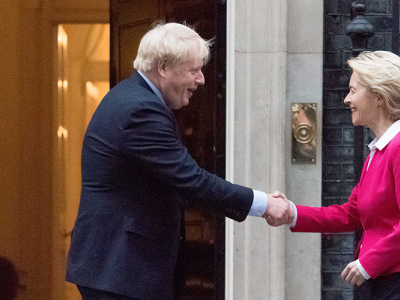
Brexit and development cooperation: A major connection problem
The European Union and the United Kingdom start 2021 with no formal agreement for cooperation in development, and no dedicated mechanisms to promote coordination or collaboration. Both parties will be weaker for it.
The no-deal outcome for development cooperation
When the EU-UK trade and cooperation agreement was announced on 24 December, Michel Barnier, the EU’s chief Brexit negotiator, specifically lamented the lack of an agreement on foreign policy, defence and development.
While the UK-EU political declaration of October 2019 offered some hooks for development cooperation that could have been built on, these were completely and consciously ignored. Boris Johnson’s Conservative government chose to distance itself from the EU in foreign affairs, leaving development cooperation as collateral damage.
Since the Brexit negotiations began in 2016, cooperation in foreign and defence policy could count on high political interest, but development cooperation was always a bit of an afterthought.
No formal collaboration, but similar paths and inspiration for change?
Throughout the UK’s membership of the EU, the EU saw the UK’s foreign, defence, security and intelligence capabilities as assets, while development specialists also noted that the UK’s knowledge, network and spending were of considerable added value to the EU institutions. As a full EU member, the UK also had a major influence on the EU’s development policy. Since 2016, the way in which the EU and the UK organised their own institutional set-ups for development cooperation has evolved significantly – driven by global change and domestic political pressure, as much as Brexit.
The UK and the EU signed up and are bound to the UN’s 2030 Agenda for Sustainable Development. They are both part of the UN, the OECD-DAC and other norm-setting frameworks, and both will continue to cooperate in these fora as well as with developing countries. Yet, for over a decade, development cooperation policy in the EU and the UK has been moving towards an international cooperation agenda where national interests are more clearly on the table, and where development cooperation is seen, planned and implemented as an integrated part of foreign policy.
The EU moves to integrate development cooperation more within its foreign policy
In the EU, the successful move to create a new integrated and ‘policy-led’ Neighbourhood, Development and International Cooperation Instrument (NDICI) for the period 2021-2027 is a major break from the past. Without the UK putting money in the pot and defending EU spending on international affairs as it had done in the past, the NDICI budget was deemed vulnerable. Yet the €70.8 billion instrument, for which originally €79 billion was proposed (both 2018 numbers), did not suffer as big a cut as some thought was possible because of Brexit.
Further, as part of the European Commission’s geopolitical ambitions, the European commissioner post for ‘international cooperation and development’ was renamed ‘international partnerships’. The Commission’s directorate-general traditionally tasked with leading development cooperation will also become the Directorate-General for International Partnerships in 2021.
The UK cuts spending and autonomy for development cooperation as part of its revised foreign policy
In 2020, the UK saw a more profound shift in its development policy architecture. First, the separate ministerial Department for International Development (DFID) was folded into the Foreign Office, with the loss of a cabinet-level minister for international development. Then there was the cut to UK foreign aid – the result of a reduction of the legally enshrined target of spending 0.7% of gross national income (GNI) on aid to 0.5%, and a declining UK GNI in the wake of the COVID-19 pandemic. Few in Europe were surprised by these changes, which can be seen as part of the same nationalistic political trend that brought Brexit.
That being said, almost none of the EU countries have standalone development ministries either (Germany’s Federal Ministry for Economic Cooperation and Development (BMZ) is the exception). Moreover, while EU countries such as Sweden, Luxembourg and Denmark have been long-time champions of official development assistance (ODA) and achieved the target of spending 0.7% of GNI on aid, none of the ‘large’ European countries have – apart from Germany in 2016.
Still, overall, the UK’s standing as a self-declared ‘development superpower’ has taken a serious knock.
So will EU development cooperation evolve without the UK?
It has been difficult to detect a significant shift in EU development policy due to the UK’s departure. In fact, it has not produced significant changes to the European Consensus on Development of 2017, the NDICI negotiations, theEU’s new political agreement with the Organisation of African, Caribbean and Pacific States, the EU’s Africa strategy and the new Gender Action Plan, nor to priorities like migration management, and the ever-increasing focus on blending grants and loans.
While the UK was highly influential, EU development policy always had to be negotiated to reach consensus. Yet below the surface, the overall weight of France, Germany and the European Commission as the major players is more keenly felt. These three players are taking up more of the space left by the UK to influence the EU’s development policy agenda. While leadership is needed for EU development cooperation, a too dominant role for any of the three major players can cause resentment and lack of buy-in on the longer term.
At the same time, there is a new balance of power as mid-sized, smaller and newer EU member states have also forged new alliances to advance some of their priorities. On a different track, Hungary and Poland have also blocked certain initiatives in the EU development policy sphere on issues linked to migration, gender equality and sexual health and reproductive rights as part of a more general use of their blocking power.
Overall, a new dynamic exists without the UK, and it will be interesting to see how this will shift EU development policy in the coming years.
Will the EU and the UK connect again in the future?
This seems highly likely – the question is when, how, to what consequence, and in what type of world. The ‘when’ very much depends on the political tone set at the higher levels. At a more functional and operational level, the UK and the EU will still be looking for international partners, political backing, alliances and money for their priorities and initiatives.
The UK and the EU will also share many development partners. Senior officials in the EU and the UK still know their contemporaries (for now), often personally, and in developing countries the EU heads of delegation and UK ambassadors will certainly still engage with each other. Outside the official networks, the UK knowledge networks and non-governmental channels – many of which have already established an EU legal presence – will also still be active and somewhat engaged.
But the absence of a more formalised forum for engagement on the EU side because of the UK’s lack of enthusiasm to pursue one, will make it quite hard for formal ongoing collaboration (and influencing) in development cooperation. On the ‘how’, there are various formats that the EU used for interaction with industrialised third countries for a ‘development dialogue’ in the past. These formats have had varying degrees of success, frequency, seniority and importance over the last ten years with Canada, the US, Japan, Australia and South Korea.
The question is really whether there is much enthusiasm from either the UK or the EU for this. Particularly now that DFID has been subsumed into the UK’s Foreign Office and a cabinet-level minister on the UK side has been lost, there will not be as much political leadership or bureaucratic autonomy to explore this on the UK side. This won’t stop the odd jointly hosted conference, joint funding initiative or consolidation of positions at the multilateral level; all probably announced with some fanfare.
For the EU and the UK’s development partners, this much looser ad hoc relationship may bring opportunities to strike a better deal here and there, yet it is also likely to bring fragmentation, duplication and at times unhelpful competition. It would also be interesting to know what the UK and the EU’s development partners think about this – is this all just some irrelevant sideshow to them, or do they see opportunities or problems? Overall some homework should be done on what kind of cooperation the UK and the EU could have when it comes to development cooperation, so when the time is politically right, it can be put back on the agenda.
The views are those of the author and not necessarily those of ECDPM.



